Harnessing the Potential of Letters of Intent: Unlocking Effective Communication and Intent-Setting With Our 25-Templates
Welcome to our website dedicated to Letters of Intent! Whether you’re a student applying for an academic program, an entrepreneur exploring business partnerships, or an individual seeking employment opportunities, Letters of Intent play a crucial role in formalizing your intentions and paving the way for successful negotiations and agreements. In this comprehensive guide, we provide valuable insights, tips, and examples to help you craft compelling and effective Letters of Intent. Discover the power of clear communication, strategic planning, and professional writing as we guide you through the process of creating impactful Letters of Intent. Let’s embark on this journey together and unlock new possibilities with the art of intention-setting through well-crafted letters!
Importance of Letters of Intent
Letters of Intent play a crucial role in various situations, including business partnerships, real estate transactions, employment, and academic pursuits. These letters serve as formal declarations of intent, expressing a party’s serious interest in moving forward with a particular course of action. Here’s how they are significant in each scenario:
- Business Partnerships: When considering a partnership with another company, a Letter of Intent outlines the preliminary terms and conditions, including the goals, responsibilities, and expectations of both parties. It serves as a starting point for negotiations and helps establish a shared understanding of the proposed partnership.
- Real Estate Transactions: In the realm of real estate, a Letter of Intent is used to indicate a buyer’s genuine interest in purchasing a property. It includes key details such as the proposed purchase price, terms, and conditions. This letter sets the foundation for further negotiations and acts as a preliminary agreement before formalizing the purchase through a contract.
- Employment: A Letter of Intent in the context of employment expresses an individual’s intention to accept a job offer. It showcases their enthusiasm for the position and confirms their availability to start work. This letter demonstrates a candidate’s commitment and helps employers plan for staffing needs.
- Academic Pursuits: Students often use Letters of Intent to express their intent to enroll in a specific educational institution or program. These letters highlight their academic achievements, aspirations, and reasons for choosing the institution or program. They serve as formal applications and can enhance the chances of acceptance.
In all these situations, Letters of Intent set the foundation for further negotiations and agreements. They demonstrate a party’s seriousness and commitment, allowing other parties involved to gauge interest and proceed accordingly. While Letters of Intent are typically not legally binding, they create a starting point for more detailed contracts or agreements, providing clarity and transparency to all parties involved.
#1: Academic Letter of Intent:
Used by students to express their intent to enroll in a particular educational institution or program, often accompanied by supporting documents such as transcripts or recommendation letters. The Academic Letter of Intent is a document used by students to express their intention to enroll in a specific educational institution or program. It serves as an introduction that communicates the student’s genuine interest, motivation, and commitment to pursuing their academic goals. The letter aims to create a favorable impression on the admissions committee by highlighting the student’s qualifications and aspirations, ultimately seeking to secure a place in the desired educational program.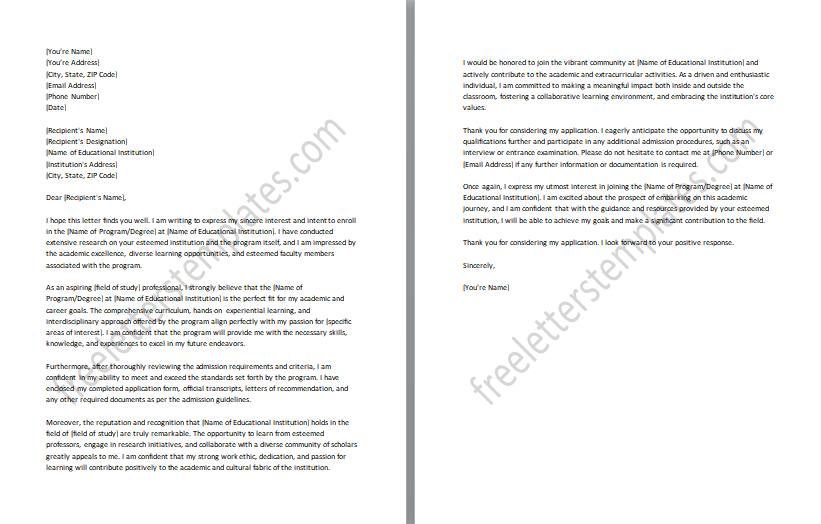
#2: Business Partnership Letter of Intent:
Outlines the preliminary terms and conditions for a potential partnership between two or more businesses, including goals, responsibilities, and expectations. The Business Partnership Letter of Intent is a crucial document that outlines the preliminary terms and conditions for a potential partnership between businesses. It serves as a roadmap for discussions and negotiations, highlighting shared goals, responsibilities, and expectations. This letter lays the foundation for a successful and mutually beneficial business partnership, fostering open and productive conversations. Its purpose is to create a framework that drives growth and success for all parties involved.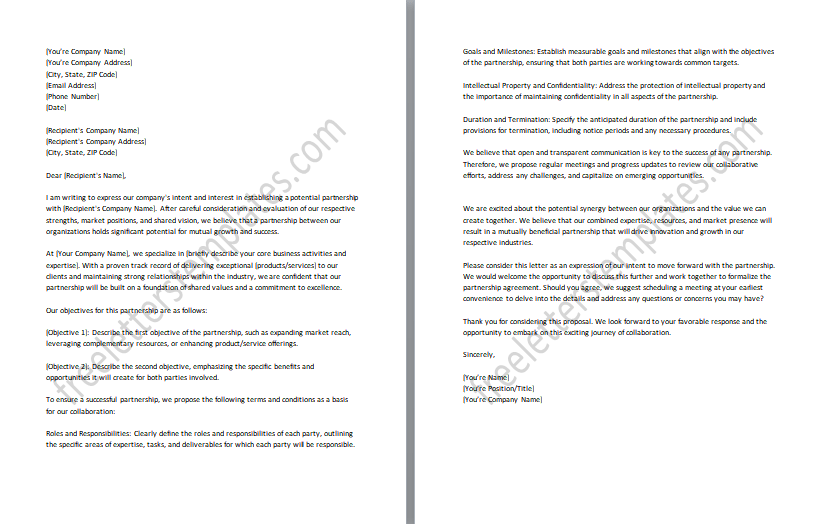
#3: Employment Letter of Intent:
Expresses an individual’s intention to accept a job offer, highlighting their enthusiasm for the position and confirming their availability to start work. The Employment Letter of Intent is a letter in which an individual expresses their intention to accept a job offer extended to them. It serves as a formal confirmation of their interest and enthusiasm for the position. Additionally, it may express gratitude for the opportunity, outline relevant qualifications and experience, and reiterate the individual’s commitment to contributing to the organization’s success. The Employment Letter of Intent plays a crucial role in establishing clear communication between the individual and the employer, ensuring a smooth transition into the new role.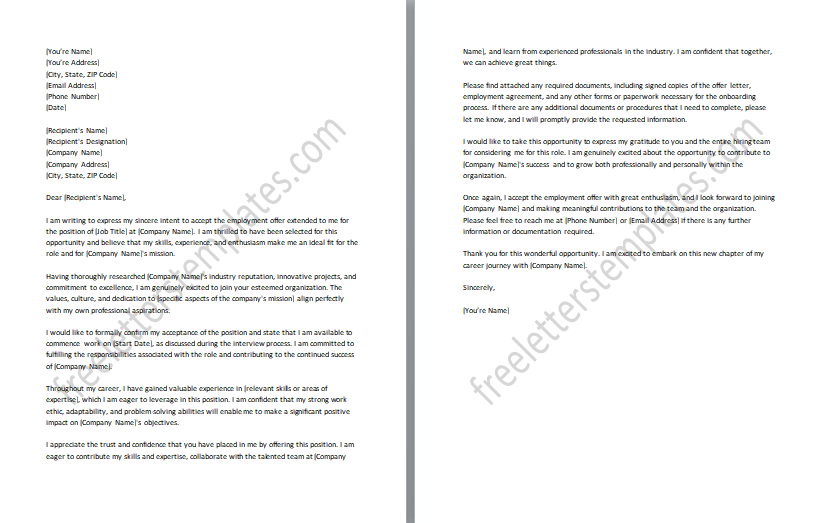
#4: Research Grant Letter of Intent:
Submitted to funding agencies or organizations to express an interest in applying for a research grant, outlining the proposed project, its significance, and the researcher’s qualifications. The Research Grant Letter of Intent is a document submitted to funding agencies or organizations to express an interest in applying for a research grant. It outlines the proposed project, its significance, and the qualifications of the researcher. This letter serves as an initial step in the grant application process, capturing the attention of funding agencies and paving the way for a comprehensive grant proposal submission.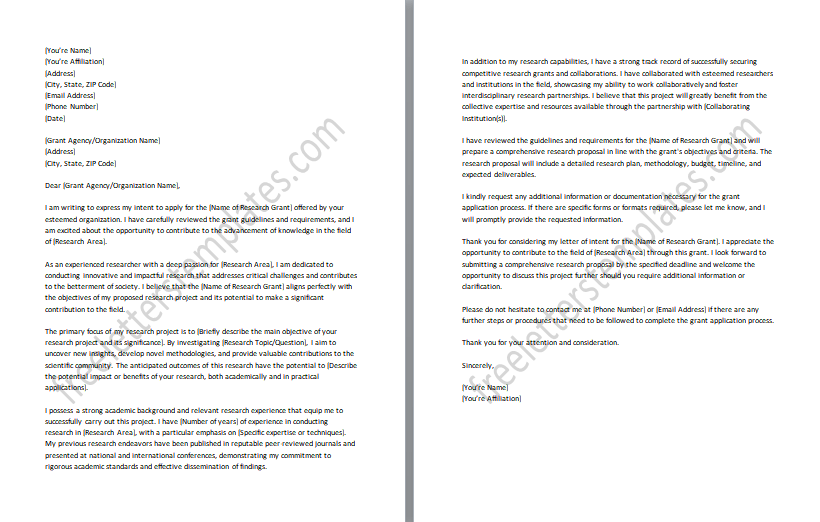
#5: Real Estate Letter of Intent:
Used in real estate transactions to establish the buyer’s serious interest in purchasing a property, stating the proposed purchase price, terms, and conditions. The Real Estate Letter of Intent is a document used in real estate transactions to demonstrate the buyer’s serious interest in purchasing a property. It serves as a preliminary agreement that outlines the proposed purchase price, terms, and conditions of the transaction. The letter aims to establish a mutual understanding between the buyer and the seller, expressing the buyer’s intent to proceed with the purchase. It can be a crucial step in initiating negotiations and moving closer to the final purchase agreement.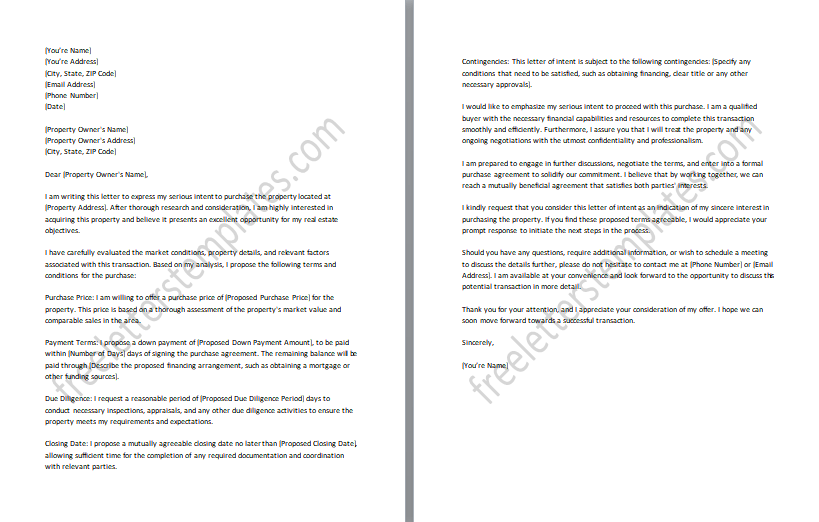
#6: Vendor Letter of Intent:
Expresses a company’s intent to engage a particular vendor or supplier, outlining the desired goods or services, pricing, and any specific requirements. The Vendor Letter of Intent is a document used by a company to express its intent to engage a specific vendor or supplier. Additionally, the letter may address pricing, payment terms, delivery schedules, and any other relevant details. The Vendor Letter of Intent serves as a formal communication that signals the company’s interest in establishing a business relationship with the vendor and initiates further discussions and negotiations. It provides a clear starting point for both parties to define the terms and conditions of their collaboration.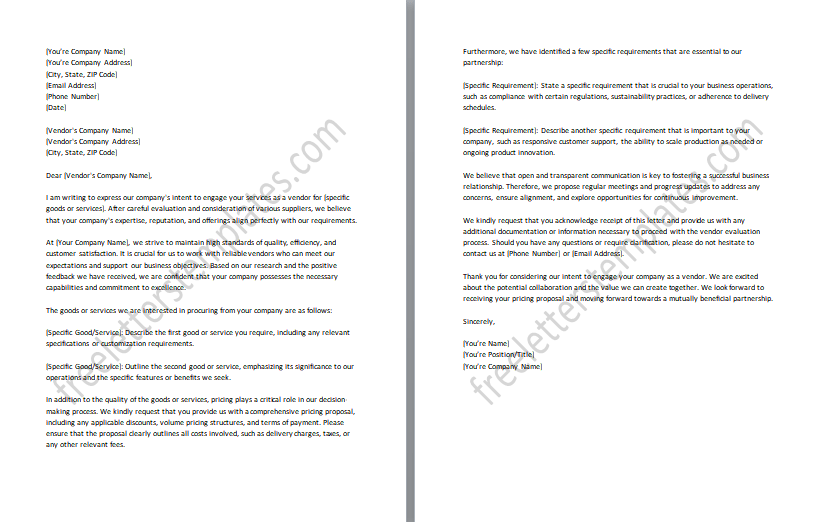
#7: Joint Venture Letter of Intent:
Outlines the intention of two or more parties to collaborate on a specific business project or venture, including the proposed terms, goals, and sharing of resources. The Joint Venture Letter of Intent outlines the intention of two or more parties to collaborate on a business project. It expresses the proposed terms, goals, and resource sharing. This letter serves as a preliminary agreement, setting the foundation for further discussions and the formalization of the joint venture.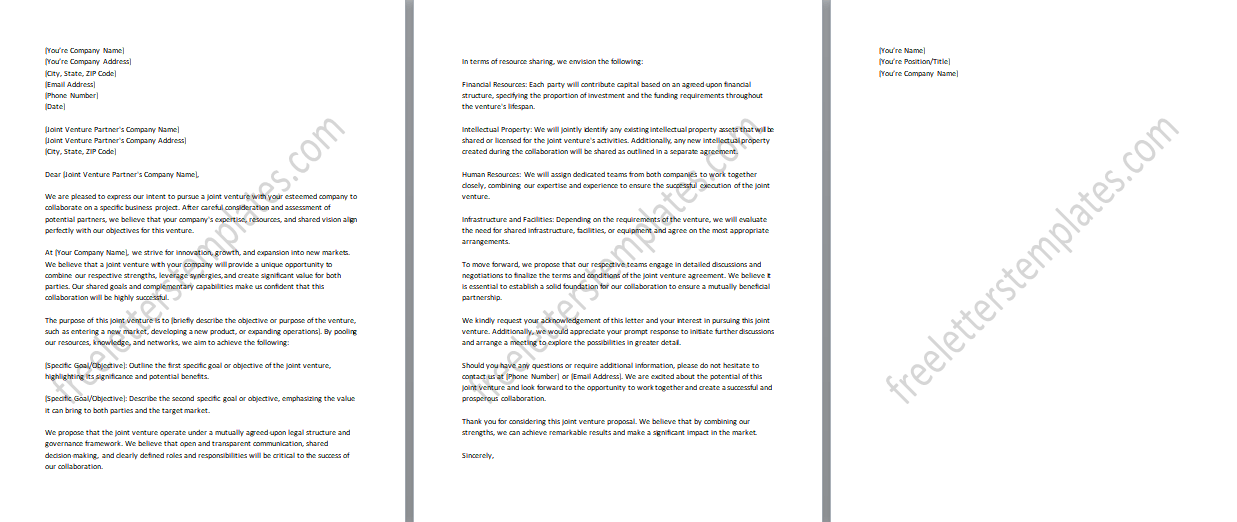
#8: Licensing Letter of Intent:
Expresses the intention to grant or obtain a license for a product, technology, or intellectual property, outlining the terms, royalties, and usage rights. The Licensing Letter of Intent is a document that expresses the intention to grant or obtain a license for a product, technology, or intellectual property. It outlines the terms of the licensing agreement, including royalties, usage rights, and any specific conditions. This letter serves as a formal communication between the licensor and the licensee, expressing their mutual interest and laying the groundwork for further negotiations and the finalization of the licensing agreement. It helps establish clarity and understanding regarding the rights and obligations associated with the licensed product, technology, or intellectual property.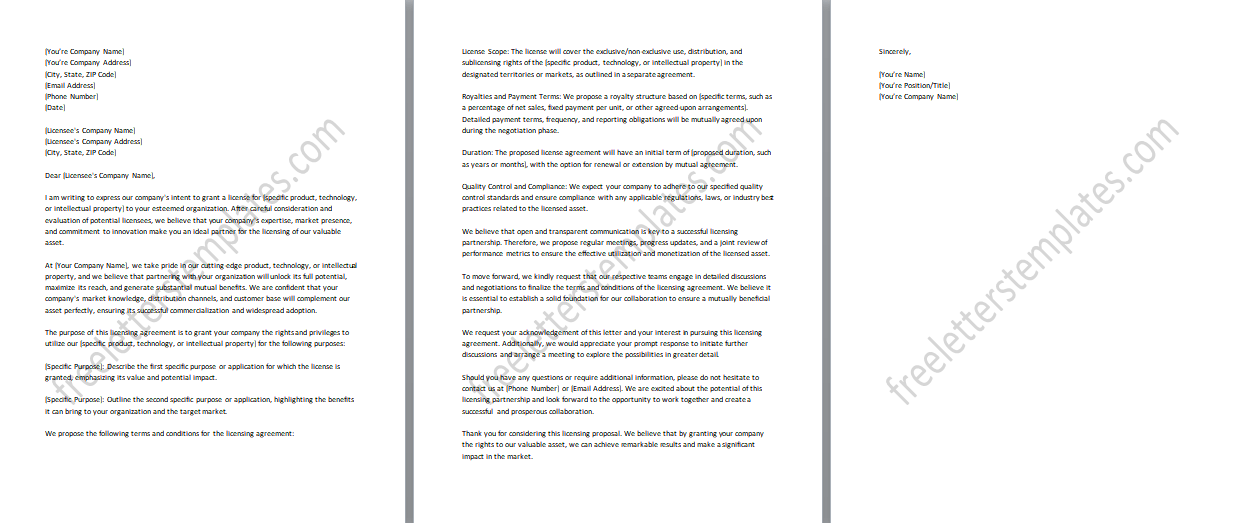
#9: Non-Disclosure Agreement Letter of Intent:
States the intention to enter into a non-disclosure agreement (NDA) to protect confidential information shared between two parties during business negotiations. The Non-Disclosure Agreement (NDA) Letter of Intent states the intention of two parties to enter into a non-disclosure agreement to safeguard confidential information exchanged during business negotiations. It expresses the commitment of both parties to protect sensitive data and outlines the scope and duration of the proposed NDA. By establishing clear intentions regarding the protection of confidential information, the NDA Letter of Intent helps create a secure environment for open discussions and fosters a foundation of trust between the parties involved.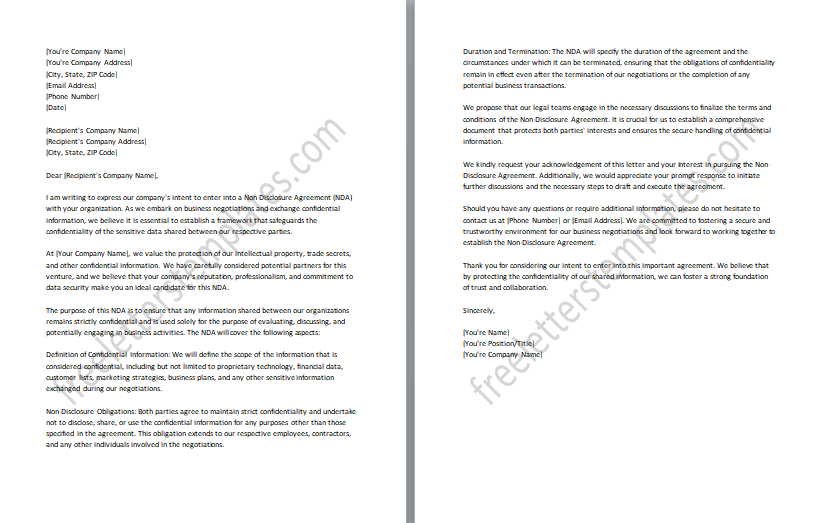
#10: Investment Letter of Intent:
Expresses an investor’s intent to invest a certain amount of money in a business or project, highlighting the terms, expected returns, and any conditions or contingencies. The Investment Letter of Intent is a document that expresses an investor’s intention to invest a specific amount of money in a business or project. It outlines the terms of the investment, including expected returns, conditions, and any contingencies. The letter highlights the investor’s interest, financial commitment, and desired level of involvement. The Investment Letter of Intent helps establish a clear understanding between the investor and the business or project, laying the groundwork for a potential investment agreement.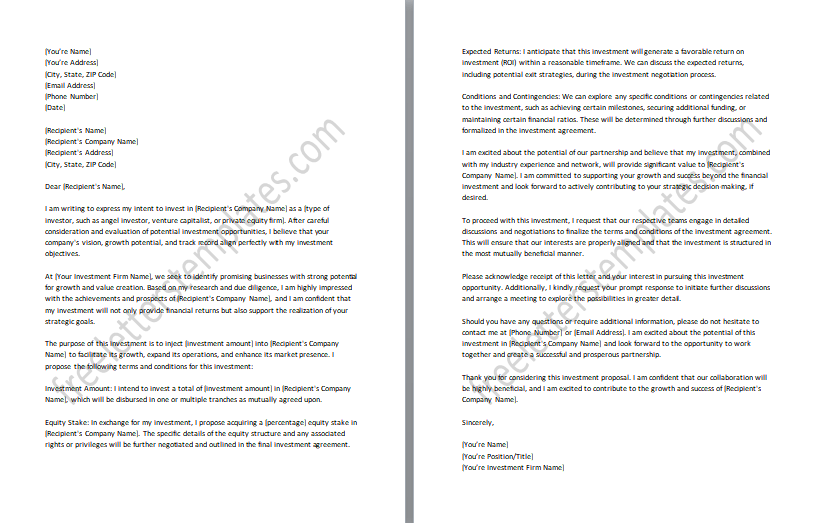
#11: Sponsorship Letter of Intent:
Expresses the intent to seek sponsorship from a company or organization, outlining the proposed sponsorship opportunities, benefits, and marketing exposure. The Sponsorship Letter of Intent is a document that expresses the intent to seek sponsorship from a company or organization. It outlines the proposed sponsorship opportunities, highlighting the benefits and marketing exposure that the sponsoring entity can receive. The letter emphasizes the alignment between the sponsor’s objectives and the event, project, or initiative seeking sponsorship. It provides an overview of the sponsorship benefits, such as logo placement, brand visibility, and promotional opportunities. The Sponsorship Letter of Intent serves as an initial pitch to capture the interest of potential sponsors and initiate further discussions on the terms and conditions of the sponsorship agreement.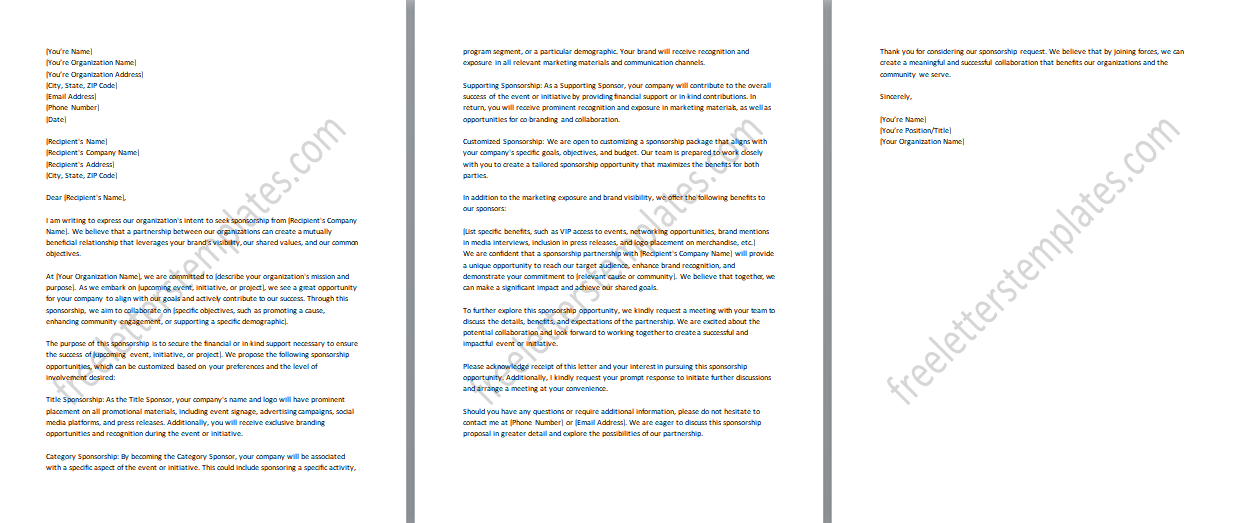
#12: Scholarship Letter of Intent:
Submitted by students to express their intent to apply for a scholarship, highlighting their achievements, aspirations, and the reasons they should be considered. The Scholarship Letter of Intent is a document submitted by students to express their intent to apply for a scholarship. It serves as a personal statement that highlights their achievements, aspirations, and the reasons they should be considered for the scholarship. It allows them to articulate their educational goals and career aspirations, and how receiving the scholarship would positively impact their academic journey. The Scholarship Letter of Intent plays a crucial role in conveying the student’s passion, dedication, and potential to the scholarship committee, increasing their chances of being awarded the scholarship.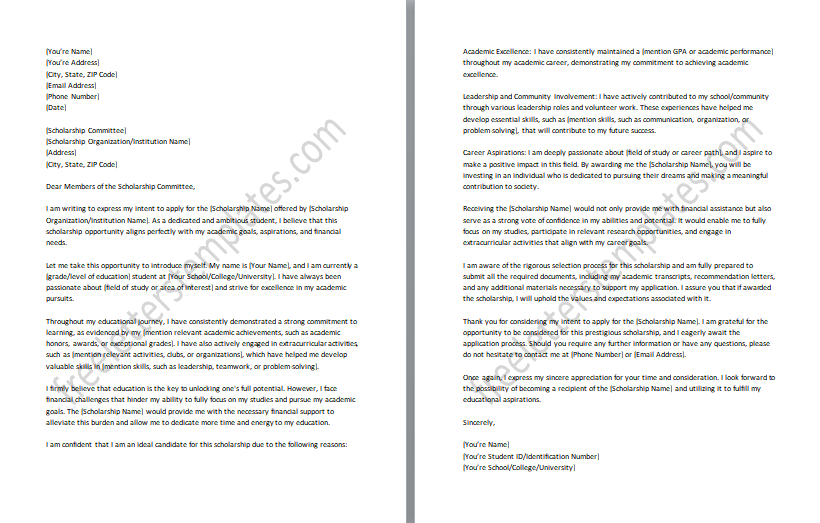
#13: Medical Residency Letter of Intent:
Written by medical students or graduates to express their intent to join a specific medical residency program, emphasizing their qualifications, interests, and dedication. The Medical Residency Letter of Intent is a document written by medical students or graduates to express their intent to join a specific residency program. It emphasizes their qualifications, interests, and dedication to pursuing a career in medicine. The letter highlights their academic achievements, clinical experiences, and personal qualities that make them well-suited for the program. It serves as an important tool for residency program directors to assess the candidate’s suitability and commitment.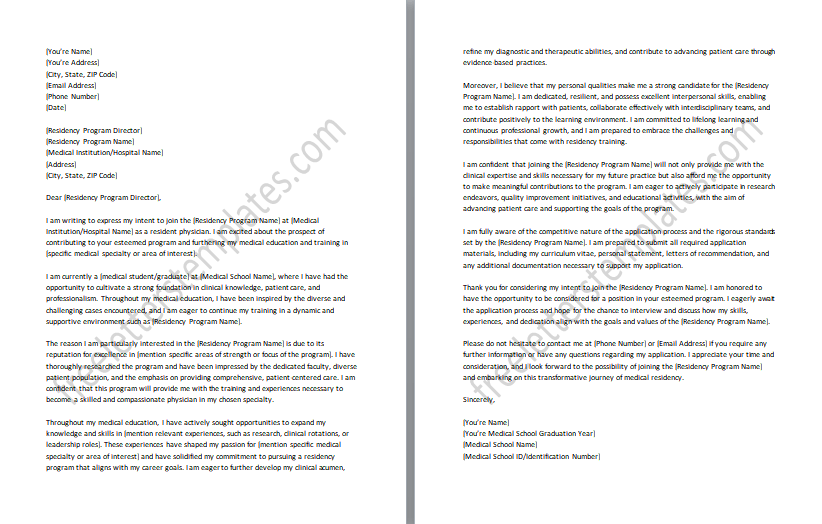
#14: Construction Project Letter of Intent:
Used in the construction industry to express the intention to enter into a contract for a specific construction project, outlining the scope, timeline, and financial terms. The Construction Project Letter of Intent is a document used in the construction industry to express the intention to enter into a contract for a specific construction project. It outlines the scope of work, the timeline for completion, and the financial terms of the project. This letter serves as a preliminary agreement that demonstrates the parties’ serious intent to proceed with the project. It provides a framework for further negotiations and helps establish a common understanding of the project’s key details. The Construction Project Letter of Intent serves as a starting point for the formalization of the contract and lays the groundwork for a successful collaboration between the parties involved.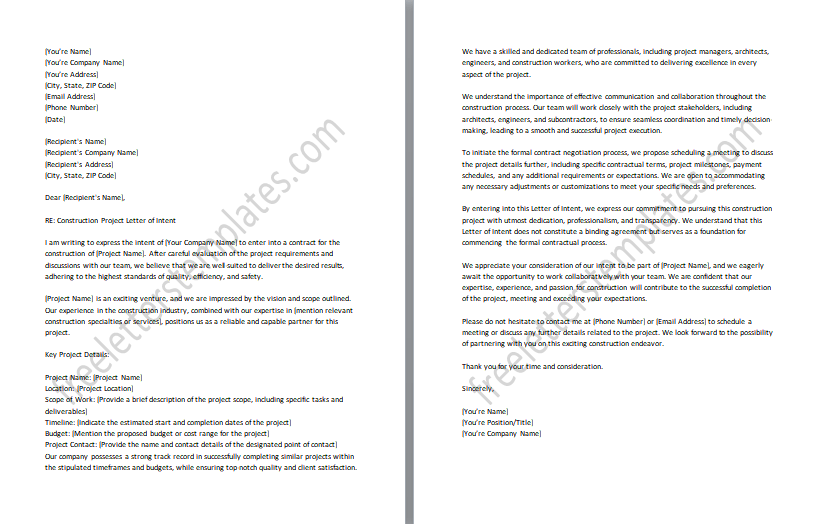
#15: Purchase Letter of Intent:
States the intention to purchase a product, business, or asset, including the proposed purchase price, terms, and any conditions or contingencies. The Purchase Letter of Intent is a document that states the intention to purchase a product, business, or asset. It outlines the proposed purchase price, terms, and any conditions or contingencies that may apply. This letter serves as a formal expression of interest and sets the foundation for further negotiations and due diligence. It provides clarity and transparency regarding the buyer’s intent, facilitating a smoother transaction process. The Purchase Letter of Intent helps establish a mutual understanding between the buyer and the seller, laying the groundwork for the eventual purchase agreement.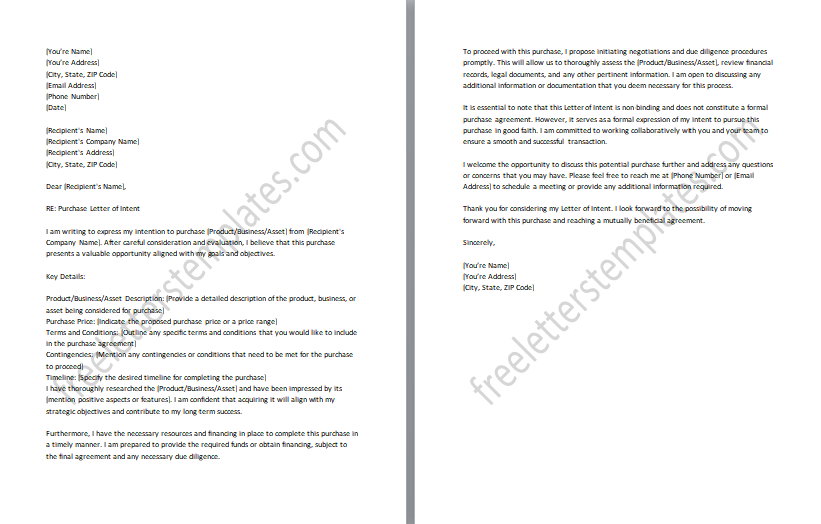
#16: Supplier Letter of Intent:
Expresses the intent to become a supplier for a company or organization, providing details about the products or services offered, pricing, and delivery terms. The Supplier Letter of Intent is a document that expresses the intent to become a supplier for a company or organization. This letter serves as an introduction and showcases the supplier’s capabilities, quality standards, and commitment to meeting the buyer’s needs. It establishes a preliminary agreement and initiates discussions between the supplier and the company or organization to explore potential collaboration. The Supplier Letter of Intent helps pave the way for further negotiations and the development of a formal supplier agreement.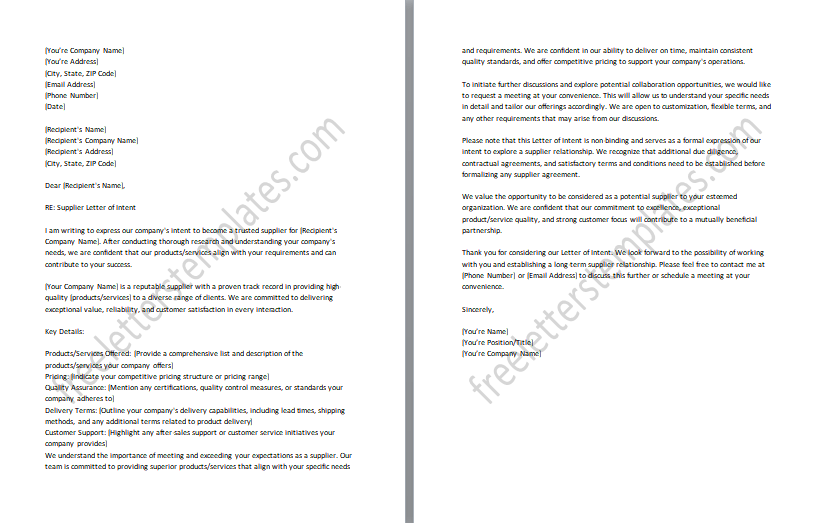
#17: Franchise Letter of Intent:
Submitted by individuals interested in owning a franchise to express their intent to proceed with the franchise application process, highlighting their qualifications, financial capacity, and commitment. The Franchise Letter of Intent is a document submitted by individuals interested in owning a franchise. It expresses their intent to proceed with the franchise application process and highlights their qualifications, financial capacity, and commitment to the franchise opportunity. This letter serves as an introduction and initial expression of interest to the franchisor. It outlines the applicant’s relevant experience, skills, and background that makes them a suitable candidate for owning and operating the franchise. The Franchise Letter of Intent plays a vital role in initiating communication with the franchisor and initiating the evaluation process for potential franchise owners.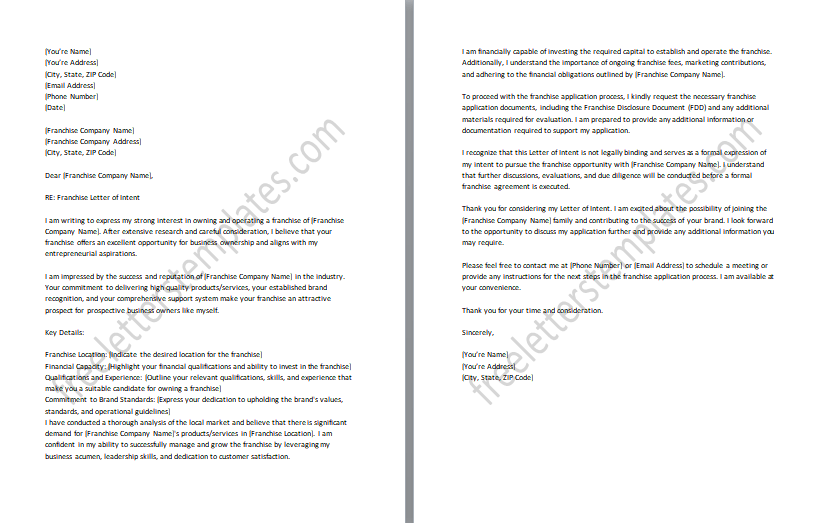
#18: Lease Letter of Intent:
Outlines the intention to enter into a lease agreement for a property, specifying the lease duration, rental terms, and any additional conditions or requirements. The Lease Letter of Intent is a document that outlines the intention to enter into a lease agreement for a property. It specifies the lease duration, rental terms, and any additional conditions or requirements desired by the potential tenant. This letter serves as a formal expression of interest to the landlord, indicating the tenant’s seriousness in pursuing the lease. The Lease Letter of Intent helps establish a mutual understanding between the tenant and the landlord, facilitating a smoother leasing process and minimizing misunderstandings.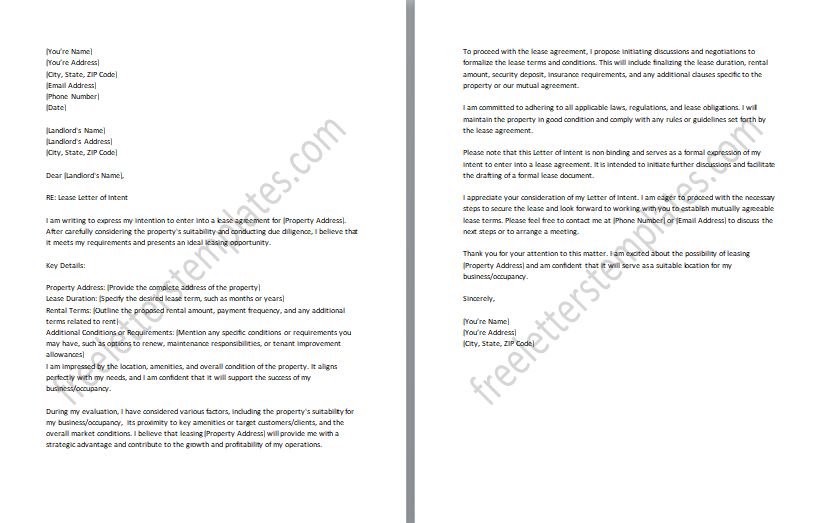
#19: Event Participation Letter of Intent:
Expresses the intent to participate in an event, such as a conference, exhibition, or trade show, outlining the desired involvement, booth requirements, and any sponsorship opportunities. The Event Participation Letter of Intent is a document that expresses the intent to participate in an event, such as a conference, exhibition, or trade show. It outlines the desired involvement, booth requirements, and any sponsorship opportunities sought by the participant. It provides an opportunity to discuss and negotiate the specific details of participation, such as booth size, location, promotional opportunities, and any special requirements. The Event Participation Letter of Intent helps establish a mutual understanding between the participant and the event organizers, setting the stage for a successful and collaborative event experience.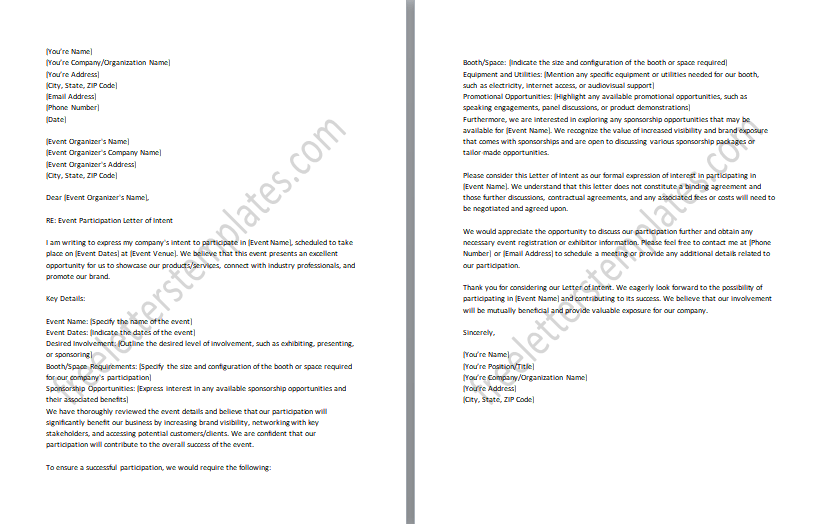
#20: Grant Proposal Letter of Intent:
Submitted to grant-making organizations to express the intent to submit a grant proposal, providing a brief overview of the proposed project, its goals, and expected outcomes. The Grant Proposal Letter of Intent is a document submitted to grant-making organizations to express the intent to submit a grant proposal. It provides a brief overview of the proposed project, including its goals and expected outcomes. This letter serves as an initial introduction to the grant-making organization, signaling the applicant’s interest and intention to seek funding for their project. The Grant Proposal Letter of Intent helps gauge the grant-maker’s interest and allows for initial feedback and guidance before proceeding with the full grant application.
#21: Product Development Letter of Intent:
Outlines the intention to collaborate on the development of a new product or innovation, specifying the roles, responsibilities, and potential intellectual property rights. The Product Development Letter of Intent is a document that outlines the intention to collaborate on the development of a new product or innovation. It specifies the roles, responsibilities, and potential intellectual property rights of the involved parties. This letter serves as a formal expression of interest to collaborate and signals the commitment to work together towards a shared product development goal. The Product Development Letter of Intent helps establish a mutual understanding between the parties involved and provides a framework for the subsequent product development agreement or contract.
#22: Merger/Acquisition Letter of Intent:
Expresses the intent of one company to merge with or acquire another company, outlining the proposed terms, valuation, and any due diligence processes. The Merger/Acquisition Letter of Intent expresses the intent of one company to merge with or acquire another company. It outlines the proposed terms, valuation, and due diligence processes. This letter serves as a formal communication, indicating the buyer’s serious interest in the transaction. It provides an initial framework for further negotiations and due diligence before finalizing the agreement.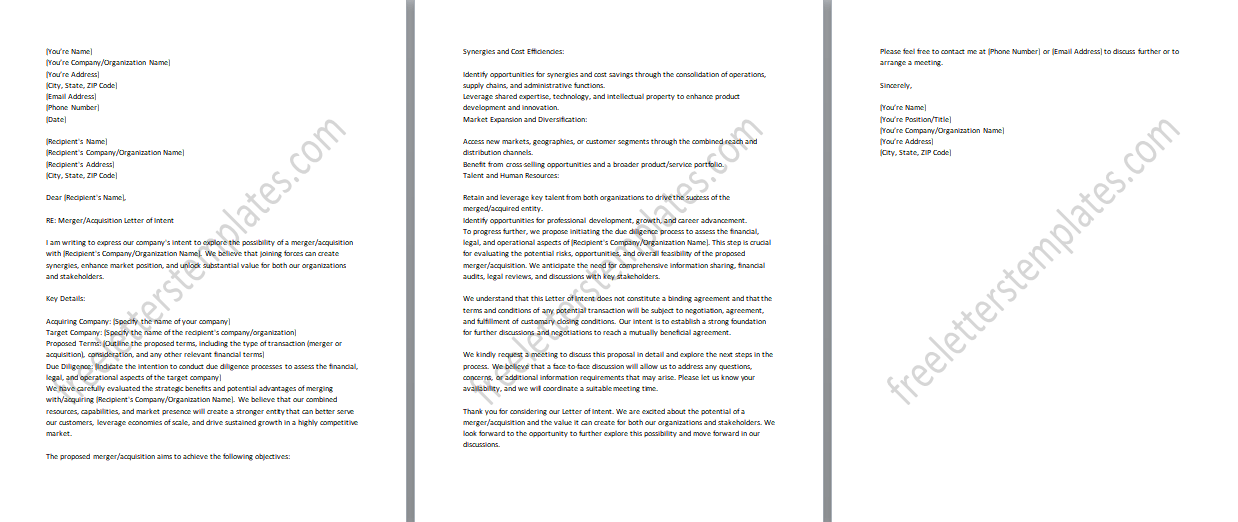
#23: Sports Scholarship Letter of Intent:
Similar to a regular scholarship letter of intent, this is specifically for athletes who intend to apply for sports scholarships, highlighting their achievements, skills, and commitment to the sport. The Sports Scholarship Letter of Intent is specifically designed for athletes who are applying for sports scholarships. This letter highlights the athlete’s achievements, skills, and commitment to the sport, emphasizing their dedication and potential for success. It serves as a formal declaration of the athlete’s intent to pursue higher education while actively participating in their chosen sport. The Sports Scholarship Letter of Intent showcases the athlete’s unique abilities and provides an opportunity to make a compelling case for their eligibility and suitability for the scholarship.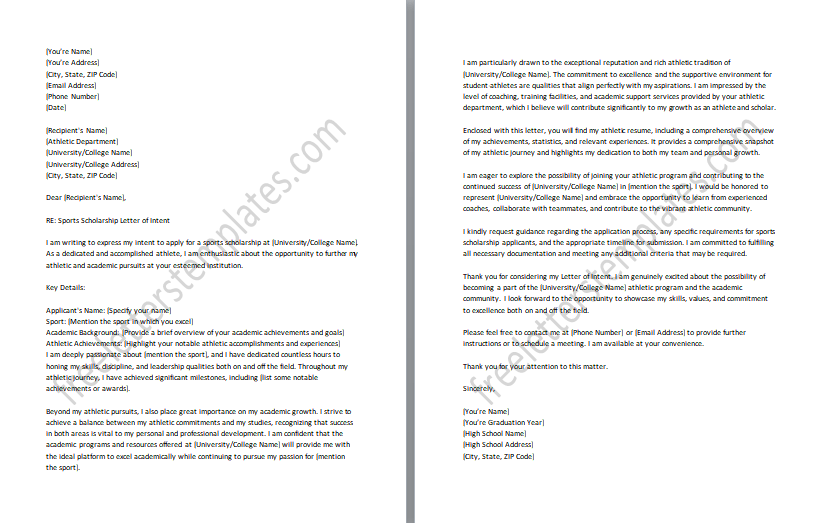
#24: Nonprofit Partnership Letter of Intent:
Expresses the intent to establish a partnership or collaboration between nonprofit organizations, outlining the shared goals, activities, and potential synergies. The Nonprofit Partnership Letter of Intent expresses the intent to establish a partnership or collaboration between nonprofit organizations. This letter outlines the shared goals, activities, and potential synergies that can be achieved through the partnership. It serves as formal communication to demonstrate the mutual interest and commitment to working together towards a common cause or objective. The Nonprofit Partnership Letter of Intent provides an opportunity to discuss the scope of the partnership, identify areas of collaboration, and explore the potential benefits for both organizations and the communities they serve.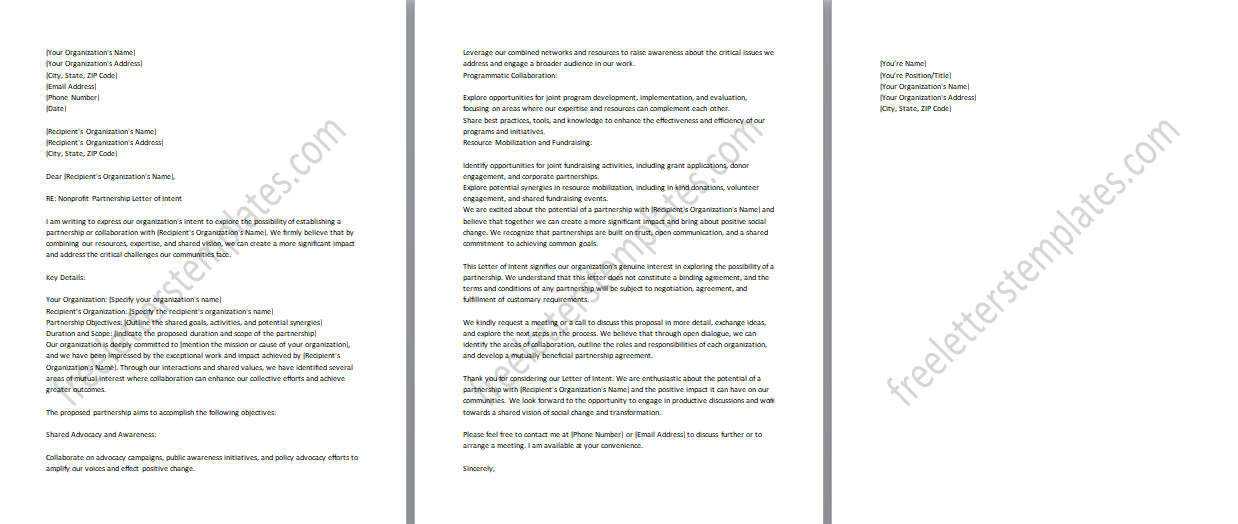
#25: Internship Letter of Intent:
Submitted by individuals seeking an internship opportunity to express their intent to intern at a specific company or organization, highlighting their relevant skills, interests, and career aspirations. The Internship Letter of Intent is a document submitted by individuals seeking an internship opportunity. It expresses their intent to intern at a specific company or organization, highlighting their relevant skills, interests, and career aspirations. This letter serves as a formal introduction and showcases the candidate’s motivation and enthusiasm for the internship position. It provides an opportunity to highlight their qualifications and any previous experience that is relevant to the internship role. The Internship Letter of Intent is a valuable tool for candidates to demonstrate their commitment to gaining practical experience in their chosen field.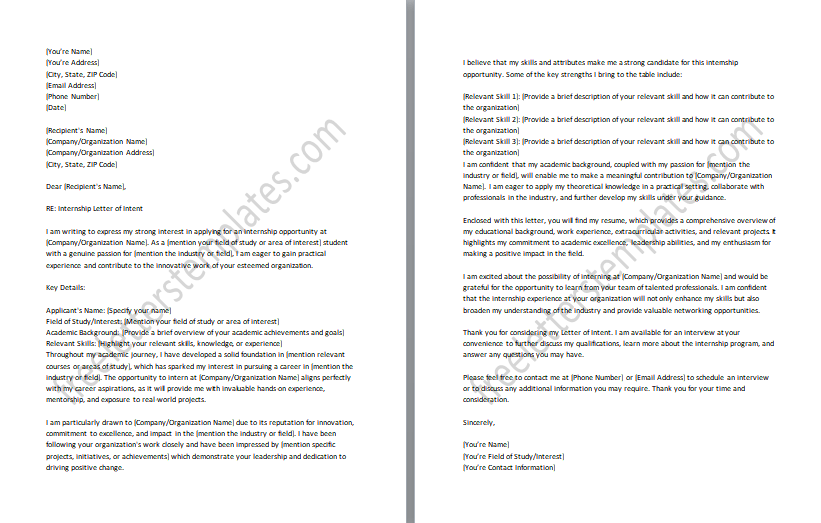
Tips for Writing an Effective Letter of Intent
- Structure your letter: Start with a clear introduction that states your intent. Organize your letter into logical paragraphs, each addressing a specific point or topic. Use headings or bullet points to enhance readability and make important information stand out.
- Use professional and concise language: Write in a formal tone and use clear, concise language. Avoid jargon or technical terms that may not be easily understood by the recipient. Keep your sentences and paragraphs brief and to the point.
- Highlight relevant qualifications: Emphasize your qualifications, achievements, and experiences that are relevant to the intent expressed in the letter. Provide specific examples to demonstrate your expertise and showcase why you are a suitable candidate for the intended partnership, sponsorship, employment, or any other purpose.
- Express genuine enthusiasm: Convey your genuine interest and enthusiasm for the opportunity or proposal. Clearly articulate why you are excited about the potential collaboration or opportunity and how it aligns with your goals or aspirations. Show your enthusiasm through positive and engaging language.
- Provide supporting documents: If applicable, include supporting documents such as resumes, portfolios, recommendation letters, or any other relevant materials that strengthen your case and provide additional credibility.
- Proofread and edit: Before finalizing your letter, carefully proofread it for grammar, spelling, and punctuation errors. Ensure the content flows smoothly and is well-structured. Consider seeking feedback from a trusted colleague or friend to ensure clarity and effectiveness.
Remember, an effective Letter of Intent is clear, persuasive, and tailored to the specific context and purpose. By following these tips, you can create a compelling letter that effectively communicates your intent and increases your chances of achieving your desired outcome.
Common Mistakes to Avoid
Here are some common mistakes to avoid when writing Letters of Intent:
- Ambiguous Language: It’s important to use clear and specific language in a Letter of Intent. Vague or ambiguous wording can lead to misunderstandings and confusion among the parties involved. Clearly state your intentions, expectations, and proposed terms to ensure clarity and avoid potential disputes.
- Lack of Specificity: A Letter of Intent should provide specific details regarding the proposed agreement or arrangement. Avoid being too general or omitting important information. Specify key terms such as timelines, financial terms, responsibilities, and any conditions or contingencies that need to be addressed.
- Failure to Address Key Points: Ensure that your Letter of Intent covers all essential aspects of the agreement or arrangement. Address important points such as pricing, deliverables, payment terms, intellectual property rights, or any other critical factors relevant to the specific situation. Failure to include these key points can create confusion or lead to disagreements later on.
- Incomplete or Inaccurate Information: Be diligent in providing accurate and complete information in your Letter of Intent. Double-check details such as names, addresses, dates, and any relevant numbers or figures. Inaccurate or incomplete information can undermine the credibility of your letter and may hinder the progress of negotiations or agreements.
- Lack of Professional Tone: Maintain a professional tone throughout the letter. Avoid using overly informal or casual language, as it may undermine the seriousness of your intent. Present yourself or your organization in a professional manner, ensuring the letter reflects your commitment, professionalism, and attention to detail.
- Failing to Seek Legal Review: Depending on the complexity and potential legal implications of the situation, it may be wise to seek legal advice or have your Letter of Intent reviewed by a legal professional. They can help ensure that the language and terms are legally sound, protecting your interests and minimizing potential risks.
Conclusion: Harnessing the Power of Letters of Intent
In conclusion, Letters of Intent play a vital role in various aspects of business, academia, and personal pursuits. They serve as formal declarations of intent, setting the foundation for further negotiations, agreements, and collaborations. By understanding the importance of a well-crafted Letter of Intent, avoiding common mistakes, and incorporating key elements such as purpose, scope, terms, and conditions, individuals can effectively communicate their intentions and increase the likelihood of achieving their desired outcomes. With the tips provided for writing an effective Letter of Intent, individuals can confidently express their interest, qualifications, and enthusiasm, making a compelling case for the opportunities they seek. Whether it’s securing a business partnership, pursuing educational endeavors, or entering into agreements, a well-crafted Letter of Intent can be a powerful tool in achieving success.